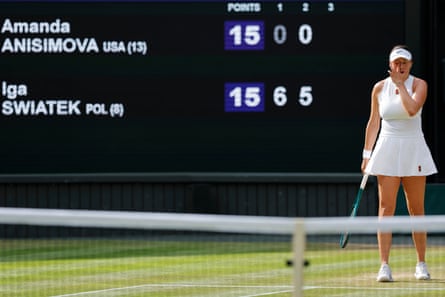This is what a scream with no vowels sounds like. This is the weight of the soul leaving the body. The arms are no longer connected to the legs, the legs have been severed from the lungs, the lungs have lost contact with the heart and the heart is getting ghosted by the brain. Amanda Anisimova sits on her chair, baking in the heat, stewing in sadness. She dabs her face with a towel and hopes people won’t notice she’s wiping away tears.
A faint voice from the outer edge of the universe calls time. She still has to go out there. She takes a deep breath. Lifts herself from her seat and takes the 18 long steps to her mark just behind the baseline. Ever found it a struggle getting up to go to work? Try summoning the strength to face Iga Swiatek when you’re losing 6-0, 5-0 in a Wimbledon final.
This was supposed to be the feelgood final. Two players who had already run through nettles and weeds to get to this point, who had already surpassed expectations, who in a way had already triumphed. Choose your own adventure: a heartwarming comeback tale for the ages, or the ultimate vindication of this generation’s greatest talent. Everyone’s a winner. How do you spin this irresistible yarn into something this bleak?
“We’ll give you a moment,” Annabel Croft says a few minutes later as the tears flow again and the inevitable applause follows. The groans and sighs of earlier have melted into sympathy and kindness. Centre Court tickets for women’s singles final day range from £240 to £315, and at that price value for money becomes a factor. But what this final lacked in actual tennis content it made up for as a historical artefact. The most one-sided grand slam final since the end of the cold war and an extra hour in the pub? Not a bad deal at all.
And of course there were numbers that could help you make sense of it all: the fact Swiatek won the first set 6-0 despite hitting two winners, the fact 35% of all the points in this match ended in an unforced error by Anisimova, the fact only 78% of Anisimova’s second serves went in. But really this game was most faithfully experienced as a kind of hot waking nightmare, a window into elite sport at its most brutal and exacting, a meltdown nobody truly saw coming.
Did it matter that Anisimova looked nervous right from the start of her warm-up, when she kept flying the ball long and couldn’t even seem to throw Swiatek a proper lob? Or that, as she would later reveal, she felt so leaden in her morning practice that she had to take a break after every single rally? Perhaps. Perhaps not. But either way these little brainworms take on a life of their own very quickly, and there are few players like Swiatek better equipped at finding your pressure point and squeezing it, sadistically and unapologetically.
Within two points Anisimova was getting pity cheers. By the end of the fourth game her ball toss was going awry and she was picking listlessly at the strings on her racket. And for all the critics of the best-of-three format there is a real clarifying brutality to it too, the terrifying knowledge you can spend a lifetime working for this opportunity and about 25 minutes screwing it up.

Amanda Anisimova was put under pressure by Iga Swiatek for the duration of the match. Photograph: Tom Jenkins/The Guardian
There is no real tactical expertise to bring to bear here. No technical analysis can ever satisfactorily explain how a player who was flaying apart the world No 1 Aryna Sabalenka two days ago now finds herself trapped in the Iga bakery, getting pinned down and force-fed. These are creatures of habit and routine, professional athletes who strive so hard to block out the external noise than when it finally comes crashing through the windows, it comes as a total shock to the system. The key to consistent success at tour level is treating every game the same. The key to mastering the big moments is tacitly accepting that no, they’re not.
skip past newsletter promotion
Sign up to The Recap
The best of our sports journalism from the past seven days and a heads-up on the weekend’s action
Privacy Notice: Newsletters may contain info about charities, online ads, and content funded by outside parties. For more information see our Privacy Policy. We use Google reCaptcha to protect our website and the Google Privacy Policy and Terms of Service apply.
after newsletter promotion
As Swiatek climbs the steps to celebrate with her team, the score is still showing on the scoreboard, the clock frozen at 57 minutes. And of course at a time like this all kinds of thoughts must intrude. What just happened? What happens now? How do you begin the day full of dreams and promise and end it as the woman who lost a Slam final 6-0, 6-0?
But of course Anisimova has endured worse things than getting double-bagelled in a Wimbledon final. She’s suffered the sudden loss of her father as a teenager, despair and depression, a crisis of purpose and meaning that forced her to leave the sport for eight months.
And if she came back from that, she can come back from this. No walk in tennis will ever be harder than the walk she made to the baseline at 6-0, 5-0 down in a Wimbledon final. No speech she ever makes will be harder than the one she made to the Centre Court crowd here. The heart breaks. But it does not break for ever.
